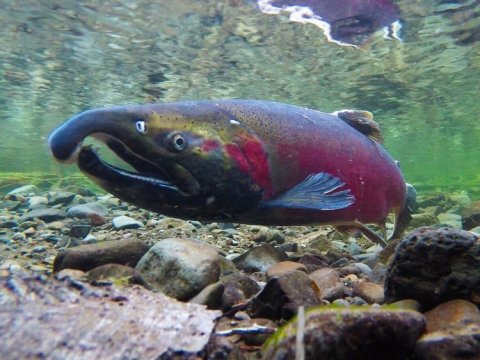[ad_1]
The ability to smell is critical for salmon. They depend on scent to avoid predators, sniff out prey and find their way home at the end of their lives when they return to the streams where they hatched to spawn and die.
New research from the University of Washington and NOAA Fisheries’ Northwest Fisheries Science Center shows this powerful sense of smell might be in trouble as carbon emissions continue to be absorbed by our ocean. Ocean acidification is changing the water’s chemistry and lowering its pH. Specifically, higher levels of carbon dioxide, or CO2, in the water can affect the ways in which coho salmon process and respond to smells.
“Salmon famously use their nose for so many important aspects of their life, from navigation and finding food to detecting predators and reproducing. So it was important for us to know if salmon would be impacted by future carbon dioxide conditions in the marine environment,” said lead author Chase Williams, a postdoctoral researcher in Evan Gallagher’s lab at the UW Department of Environmental and Occupational Health Sciences.
The study, appearing online Dec. 18 in the journal Global Change Biology, is the first to show that ocean acidification affects coho salmons’ sense of smell. The study also takes a more comprehensive approach than earlier work with marine fish by looking at where in the sensory-neural system the ability to smell erodes for fish, and how that loss of smell changes their behavior.
“Our studies and research from other groups have shown that exposure to pollutants can also interfere with sense of smell for salmon,” said Gallagher, senior co-author and a UW professor of toxicology. “Now, salmon are potentially facing a one-two punch from exposure to pollutants and the added burden of rising CO2. These have implications for the long-term survival of our salmon.”
The research team wanted to test how juvenile coho salmon that normally depend on their sense of smell to alert them to predators and other dangers display a fear response with increasing carbon dioxide. Puget Sound’s waters are expected to absorb more CO2 as atmospheric carbon dioxide increases, contributing to ocean acidification.
In the NOAA Fisheries research lab in Mukilteo, the research team set up tanks of saltwater with three different pH levels: today’s current average Puget Sound pH, the predicted average 50 years from now, and the predicted average 100 years in the future. They exposed juvenile coho salmon to these three different pH levels for two weeks.
After two weeks, the team ran a series of behavioral and neural tests to see whether the fishes’ sense of smell was affected. Fish were placed in a holding tank and exposed to the smell of salmon skin extract, which indicates a predator attack and usually prompts the fish to hide or swim away. Fish that were in water with current CO2 levels responded normally to the offending odor, but the fish from tanks with higher CO2 levels didn’t seem to mind or detect the smell.
After the behavioral tests, neural activity in each fish’s nose and brain — specifically, in the olfactory bulb where information about smells is processed — was measured to see where the sense of smell was altered. Neuron signaling in the nose was normal under all CO2 conditions, meaning the fish likely could still smell the odors. But when they analyzed neuron behavior in the olfactory bulb, they saw that processing was altered — suggesting the fish couldn’t translate the smell into an appropriate behavioral response.
Finally, the researchers analyzed tissue from the noses and olfactory bulbs of fish to see if gene expression also changed. Gene expression pathways were found to be altered for fish that were exposed to higher levels of CO2, particularly in their olfactory bulbs.
“At the nose level, we think the neurons are still detecting odors, but when the signals are processed in the brain, that’s where the messages are potentially getting altered,” Williams said.
In the wild, the fish likely would become more and more indifferent to scents that signify a predator, Williams said, either by taking longer to react to the smell or by not swimming away at all. While this study looked specifically at how altered sense of smell could affect fishes’ response to danger, it’s likely that other critical behaviors that depend on smell such as navigation, reproduction and hunting for food would also take a hit if fish aren’t able to adequately process smells.
The researchers plan to look next at whether increased CO2 levels could affect other fish species in similar ways, or alter other senses in addition to smell. Given the cultural and ecological significance of salmon, the researchers hope these findings will prompt action.
“We’re hoping this will alert people to some of the potential consequences of elevated carbon emissions,” said senior co-author Andy Dittman, a research biologist at the Northwest Fisheries Science Center. “Salmon are so iconic in this area. Ocean acidification and climate change are abstract things until you start talking about an animal that means a lot to people.”
###
Other co-authors are Paul McElhany, Shallin Busch and Michael Maher of the Northwest Fisheries Science Center; and Theo Bammler and James MacDonald of the UW Department of Environmental and Occupational Health Sciences.
This study was funded by Washington Sea Grant and the Washington Ocean Acidification Center, with additional support from the UW Superfund Research Program, the NOAA Ocean Acidification Program and the Northwest Fisheries Science Center.
For more information, contact Williams at [email protected] and Dittman at [email protected] or 206-860-3392.
Visuals available for download: https:/
[ad_2]















